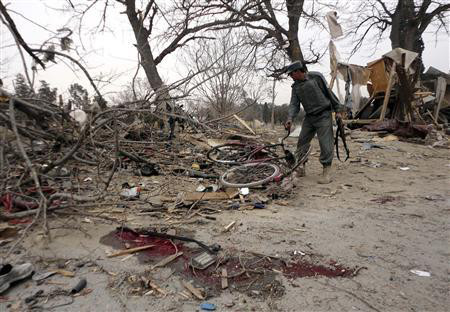By Alissa J. Rubin
KABUL, Afghanistan — Attacks in four parts of the country left at least 17 people dead on Friday, including two German soldiers, four Afghan police officers and 11 civilians, signaling the tenaciousness of the insurgency even through the winter.

An Afghan policeman inspects the site of a suicide car bomb attack in Khost province February 18, 2011. A suicide car bomb attack on a police checkpoint in eastern Afghanistan on Friday killed at least nine people and injured dozens, health and police officials said. The majority of the dead were civilians, among them three women, said Abdul Hakim Esaaqzai, chief of police for Khost province. Health official Amir Badshah said 30 people had been wounded and many taken to hospitals. (Photo: Reuters/ Stringer)
The most lethal incident occurred in the southeast province of Khost, on the edge of the provincial capital of the same name, where a suicide bomber detonated a car packed with explosives near a police checkpoint in a crowded shopping area.
The blast killed one police officer and 10 civilians, said Amir Badshah, the director of the public hospital in Khost. He said that 39 people were wounded, including five women critically.
Local people described the blast as completely unexpected since Khost City had been relatively calm over the past seven months after an aggressive effort by American troops to capture insurgent leaders and bomb-makers in the area.
The insurgency in Khost, which borders Pakistan, is heavily supported by the Haqqani Network, allies of the Taliban and the Pakistani military and intelligence services based just over the border in the tribal area of North Waziristan.
Naqeeb Isashas, whose car was slightly damaged in the blast, described it as “terrible,” adding that “the ambulances and police did not come quickly and there were bodies all over.”
The Taliban spokesman for eastern Afghanistan, Zabiullah Mujahid, claimed responsibility for the attack, saying a man named Irshad had driven the car.
The second attack, occurred in Baghlan Province, a part of northern Afghanistan thought to be safe until last summer. A man dressed as an Afghan National Army soldier opened fire on German troops at an outpost in Pul-i-Kumri, where the provincial capital is located.
Gen. Daoud Daoud, the Afghan police commander for the north of the country, said that eight Germans were wounded in the attack, which set off a firefight that lasted more than an hour. NATO and Afghan security forces were still investigating the episode.
Several local people complained about the way the foreign forces treated local residents and said that it was possible that the gunman had been provoked. “This kind of incident is taking place in Baghlan because the foreign forces do not have good behavior with the Afghan forces and then incidents take place,” said Alam Khan, a member of the provincial council.
Mr. Khan added that he and other officials were concerned that the security forces, which have grown quickly over the past year, were not vetted well enough and that it was possible for the Taliban and other insurgents to infiltrate them. “It is too easy for Taliban to target foreigners through this way, and maybe he was someone sent by the Taliban,” he said.
The third attack took place in Nangahar Province, in eastern Afghanistan, when a roadside bomb exploded under a police truck as the men were returning from defusing two other roadside bombs, said Ahmadzia Abdul Zaid, the governor’s spokesman. The explosion occurred in Spinghar District, about 35 miles from Jalalabad, the provincial capital.
“Our security forces were going to defuse two bombs in the region, but as they were coming back from the area another bomb which was placed for them went off,” Mr. Zaid said.
Meanwhile, in southern Afghanistan, a NATO service member was killed in an attack Friday, according to a NATO statement.
Sharifullah Sahak contributed reporting from Kabul, and Afghan employees of The New York Times from Khost, Kunduz and Nangahar.



